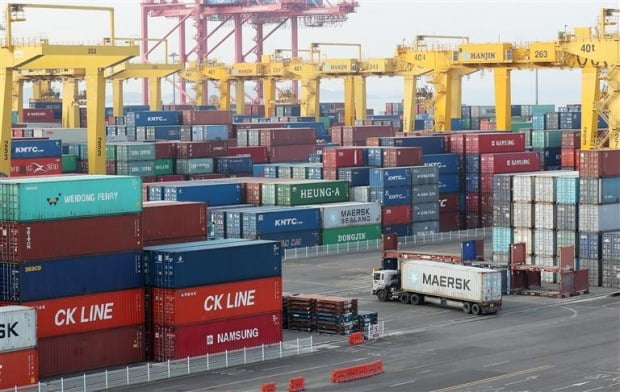
The average daily export value last month hit a record high as of February. Even though the number of working days was three less than the same month last year due to the Lunar New Year holidays, monthly exports also continued to increase for four consecutive months. As the global economy gradually escaped from the shock from the spread of the novel coronavirus infection (Corona 19), exports from most industries, from semiconductors to steel and petrochemicals, showed an increase.
Export market recovering from corona
The Ministry of Trade, Industry and Energy announced on the 1st that the export amount was totaled to $44.8 billion, an increase of 9.5% compared to the same period last year. Imports rose 13.9% to $42.1 billion, recording a trade surplus of $2.71 billion. The trade balance surplus has continued for 10 months since May last year. After the semiconductor boom in March 2018, it recorded a simultaneous increase in total exports and average daily exports for four consecutive months in 35 months.
In particular, exports of 16 out of 20 major industries increased from the same period last year. Semiconductor exports, which are rising in price due to supply shortages, increased by 13.2%, and exports of automobiles also increased by 47.0%. The base effect of the disruption in the supply of Chinese-made parts due to the spread of Corona 19 in February of last year was also important.

The recovery of global consumer sentiment is also visible. As for displays, demand for smartphones and high-end TVs increased, leading to an increase in exports (19.1%), mainly OLED (organic light-emitting diode) panels. Home appliances, which increased sales of air purifiers and clothes dryers in advanced countries, also recorded a 13.3% increase in exports. Petrochemical products also showed a high export increase of 22.4% on the back of growing demand for packaging materials and synthetic resins for home appliances due to economic revitalization.
Regionally, as the fear of Corona 19 declined due to vaccination, etc., exports increased significantly. Exports to the US increased by 7.9%, surpassing $6 billion in exports for the first time in history as of February. Chinese exports increased by 26.5%. The European Union (EU) also recorded a 48.2% increase in exports, showing a sixth consecutive month’s rise.
After March, the variable
Export recovery is expected to continue as the global market gradually deviates from the impact of the Corona 19 epidemic. However, the trade conflict between the US and China is emerging as a new bad news. Industry Minister Seong Yun-mo said on the day, “Although expectations for the recovery of global trade are growing, there are uncertainties due to changes in the trade environment, such as the spread of protectionism.”
Despite the change of power in January this year, US pressure on China continues. The Donald Trump administration decided to continue imposing punitive tariffs imposed on major Chinese companies such as Huawei at the time, and demanded that China’s purchase of U.S. goods from China in accordance with the phase 1 trade agreement between the two countries in January last year, as planned. Unlike the former Trump administration, which used the US alone to pressure China, President Joe Biden emphasized cooperation with allies, so Korea’s trade environment is likely to deteriorate. As of last year, China accounted for 25.8% of exports to Korea, and the United States was 14.5%.
Another variable is that the supply and demand of semiconductors is becoming difficult due to natural disasters. The cold wave that occurred in Texas last month is causing production disruptions to Samsung Electronics’ foundry (semiconductor consignment production) plant and NXP and Infineon, the world’s first and second largest companies in the automotive semiconductor field. TSMC, the world’s largest foundry, is also struggling to procure industrial water due to a severe drought in Taiwan. As a result, major global automakers such as Volkswagen and Toyota, as well as Hyundai Motors, have disrupted production, increasing the likelihood that exports related to automobiles and auto parts will be adversely affected.
Reporter Noh Kyung-mok [email protected]
Ⓒ Hankyung.com prohibits unauthorized reproduction and redistribution
